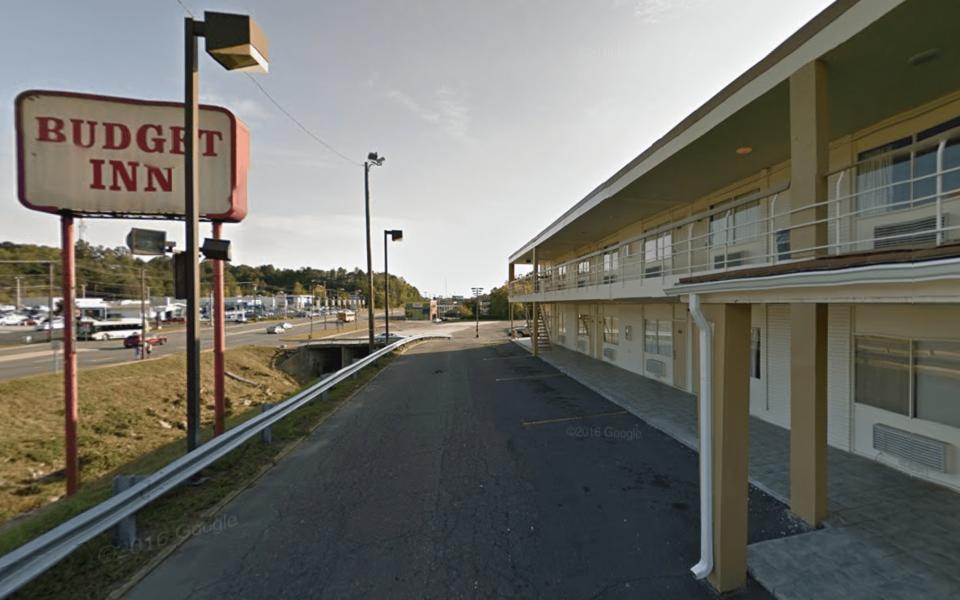Featured image: The Budget Inn off of Peters Creek Parkway is being turned into affordable housing as part of the Peters Creek Community Initiative. (Google Maps screenshot)
Akash Rohera sees the affordable housing crisis as an easy fix, if only more developers knew where to look.
As Rohera knows, there is a deficit of affordable housing both across the country and in Winston-Salem. Essentially, there are more people who need affordable housing than there are residences available. In his position as the finance director of Vivo Living, he and his team turn old hotels into residences Winston-Salem locals can actually afford.
“Last year, a ton of hotels were going under with COVID, so many hotel owners were trying to sell one or two to float their other properties,” Rohera said. “So we’re buying these things for really good pricing.”
Vivo can then rent out the properties at lower rates than other apartments in the area. A one bedroom in their North Pointe Boulevard property is $875 compared to the average rent in Winston-Salem, which is $991 according to RENTCafé.
Several experts recommend spending 30 percent or less of an income on rent, which would make a rent at $875 affordable to someone making $35,000 per year. According to City-Data, the average Winston-Salem resident makes $44,576 per year.
The problem, then, is that rent keeps going up, making the affordability of the average apartment dubious for the average renter. That, and there are fewer apartments than people who need housing. As Richard Angino of Third Wave Housing noted, “We have a demand of 14,000 units and nowhere near that many.”
Development for Vivo is minimal, since the apartments are already built and furnished. Vivo acquired a property on North Pointe Boulevard in September 2020, and Rohera says it took the company just four months to prepare for opening. The apartments, now called the Vivo Apartments, are already at 95 percent occupancy after opening at the beginning of this year.
Other properties owned by Vivo are located across the country, in places like New Braunfels, Texas, and Omaha. In New Braunfels, where the average studio costs $910 according to apartments.com, Vivo studio apartments are $600.
“Most of the markets that we’re buying in are smaller, rising cities,” Rohera told Triad City Beat. “Getting things done in major cities is impossible. But in the cities that we’re in, they’re supportive of us.”
Vivo is not the only organization doing this kind of work. The Durham Herald-Sun reported in 2017 about a hotel-turned-apartment complex in that city. Hotels have transformed into everything from senior living homes to tiny living spaces according to Senior Housing News and the Wall Street Journal.
Mark Okrant, professor emeritus of tourism management at Oklahoma State University, noted that while this has been a trend for a while, COVID-19 has certainly changed the real estate market, gaining traction for this idea.
Okrant says that motels, specifically, are the way to go. He has conducted tourism research all over the country, specifically in Alaska, Maine, New Hampshire and South Dakota as well as in Canada, Puerto Rico and Romania.
As the author of No Vacancy: The Rise, Demise, and Reprise of America’s Motels, he has seen the industry decline over the last 50 or 60 years. And although TSA data shows people are traveling at rates close to 2019 again, Okrant says that plenty of hotels from the 20th Century are out of use and stand empty.
Plus, he noted, with the Delta variant putting cities across the country back into lockdown, he cannot be sure people will continue to travel or for how long.
“I would rather see a motel retained than destroyed, which is of course the alternative, and God knows we need affordable housing in this country,” Okrant said. “If it no longer has functionality as a motel property, then I’m all for it. It’s a great idea, and it should be doable.”
Like Vivo, Third Wave Housing, based out of Winston-Salem, turned a similar building into a series of residences on Cherry Street. In the next 10 years, Richard Angino, owner and manager of Third Wave Housing, predicts growth for this movement.
He and other advocates are asking the city for more funding to help them convert the old Budget Inn on Peters Creek Parkway into housing. The project has been in the works for a while now, and was supported by former councilman Dan Besse, who called the project “a comprehensive, mixed-use redevelopment providing additional quality workforce housing in mind at the heart of it.”
Demolition began in January 2020. WFDD reported that the project received a $600,000 grant from the city, $600,000 in loans from the Forsyth County and $300,000 from a private foundation. Third Wave is also looking at old office buildings from the 1970s and ’80s.
“They’re a good opportunity, especially if not everyone goes back to a traditional office,” Angino said. “We’re seeing a demand of two-bedroom apartments, so they have space for office space or for people visiting. That’s becoming more of a demand.”
Pamela Ingram, a manager at Experiment in Self-Reliance, has seen this need up close. EISR is an organization that aims to alleviate poverty through their own programs or referrals to other organizations. Ingram says that COVID-19 has only made it worse for the people she serves. Their clients are largely Winston-Salem residents needing housing.
“In the midst of COVID, rents have been going up and we know that because of the individuals we are working with,” she said. “Before COVID, there was an effort already to identify safe and affordable housing, but it was already a concern, having affordable housing for everyone.”
As the Center for Disease Control instills a new eviction moratorium through October 3, which will allow a thin layer of protection against evictions for renters, people wonder what will happen when the smallest of reprieves during the pandemic ends and they are stuck paying the rents they owe from those months.
“Everybody should have the same opportunity for safe and affordable housing,” she continued. “There was already a shortage, so within our community, we’ve had great conversations about what that’s going to look like.”
Join the First Amendment Society, a membership that goes directly to funding TCB‘s newsroom.
We believe that reporting can save the world.
The TCB First Amendment Society recognizes the vital role of a free, unfettered press with a bundling of local experiences designed to build community, and unique engagements with our newsroom that will help you understand, and shape, local journalism’s critical role in uplifting the people in our cities.
All revenue goes directly into the newsroom as reporters’ salaries and freelance commissions.


They chose a picture of a hotel that’s been torn down for their story about turning hotels into affordable housing? If they rebuild on that site, either rent will be much higher than $875 or the city and state will be in a financial hole. And who are these few “experts” claiming someone making $35k can afford $875 in rent? I doubt most making that can afford 30% when they have lots of other bills. I guess listening to “experts” instead of getting out and actually speaking to people in need is why the country is in this housing crisis.
I agree , I Don t even pay that for a 3 bedroom house that I m living in…I HAve seen the apartments that they currently own on north point its not worth it